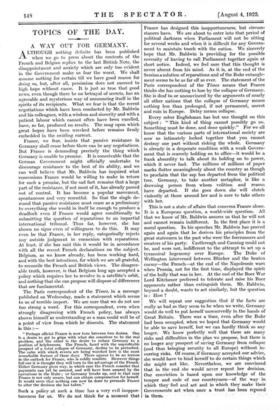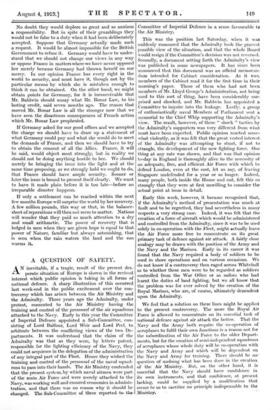A LTHOUGH nothing definite has been published when we go to
press about the contents of the French and Belgian replies to the last British Note, the disappointment and anxiety which are only too evident in the Government make us fear the worst. We shall assume nothing for certain till we have good reason for doing so, but, after all, pessimism does not succeed to high hope without cause. It is just as true that good news, even though there be no betrayal of secrets, has an agreeable and mysterious way of announcing itself in the spirits of its recipients. What we fear is that the recent negotiations which have been conducted by Mr. Baldwin and his colleagues, with a wisdom and sincerity and with a patient labour which cannot often have been excelled, have, so far, produced no results. The snag upon which great hopes have been wrecked before remains firmly embedded in the swirling current.
France, we fear, insists that passive resistance in Germany shall cease before there can be any negotiations. But France is demanding precisely the thing which Germany is unable to promise. It is conceivable that the German Government might officially undertake to discourage resistance to the best of its ability, and we can well believe that Mr. Baldwin has inquired what concessions France would be willing to make in return for such a promise, but the sad fact remains that a large part of the resistance, if not most of it, has already passed out of control. It has become a popular movement, spontaneous and very resentful. So that the single de- mand that passive resistance must cease as a preliminary to everything else would in itself be enough to produce a deadlock even if France would agree conditionally to submitting the question of reparations to an impartial international tribunal. Thus far, however, she has shown no signs even of willingness to do this. It may even be that France, in her reply, categorically rejects any outside judgment in connexion with reparations. At least, if she has said this it would be in accordance with all the recent French declarations on the subject. Belgium, as we know already, has been working lard, and with the best intentions, for which we are all grateful, to reconcile the French and British views. The disagree- able truth, however, is that Belgium long ago accepted a policy which requires her to revolve in a satellite's orbit, and nothing that she can propose will dispose of differences that are fundamental.
The Paris correspondent of the Times, in a message published on Wednesday, made a statement which seems to us of terrible import. We are sure that we do not use too strong a word. For this correspondent, even when strongly disagreeing with French policy, has always shown himself as understanding as a man could well be of a point of view from which he dissents. The statement is this :- " Perhaps official France is now torn between two desires. One is a desire to get to grips with what she conceives to be the real problem, and the other is the desire to reduce Germany to a position of helplessness. The French, faced with the unprofitable prospect of a total collapse of Germany, decline to be perturbed. The calm with which events are being watched here is the most remarlmble feature of these days. There appear to be no terrors in the outlook for France, who is coldly resolute. However things fall out it is thought they will turn to the advantage of the French. Either Germany gives way, in which case the French consider that payments can yet be assured, and will have been assured by the operations in the Ruhr ; or Germany breaks up, and in that case France is not only secure. but can obtain compensation for herself. It would seem that nothing can now ' be done to persuade France to alter the decision she has taken."
Such a policy at such a time has a very evil inoppor- tuneness for us. We do not think for a moment that France has designed this inopportuneness, but circum- stances have. We are about to enter into that period of political darkness when Parliament will not be sitting for several weeks and when it is difficult for any Govern- ment to maintain touch with the nation. We sincerely hope that Mr. Baldwin is providing for the possible necessity of having to call Parliament together again at short notice. Indeed, we feel sure that this thought is never absent from his mind. As it is, at the end of the Session a solution of reparations and of the Ruhr entangle- ment seems to be as far off as ever. The statement of the Paris correspondent of the Times means that France thinks she has nothing to lose by the collapse of Germany. She is deaf to or unconvinced by the arguments of nearly all other nations that the collapse of Germany means nothing less than prolonged, if not permanent, unrest and ruin in Europe. Delay means collapse.
Every sober Englishman has but one thought on this subject : " This kind of thing cannot possibly go on. Something must be done, and done quickly." For we all know that the various parts of international society are now so intimately locked together that you cannot destroy one part without risking the whole. Germany is already in a desperate condition with a weak Govern- ment that is scarcely holding on to office—it would be a frank absurdity to talk about its holding on to power, which it never had. The millions of millions of paper marks flutter meaninglessly about the country as though to proclaim that the sap has departed from the political tree. Germany, to take another metaphor, is like a drowning person from whom volition and reason have departed. If she goes down she will clutch violently at those around her and is sure to take others with her.
This is not a state of affairs that concerns France alone.
It is a European question, a world-wide question. All that we know of Mr. Baldwin assures us that he will not acid cannot remain indifferent. In the first place it is a moral question. In his speeches Mr. Baldwin has proved again and again that he derives his principles from the great statesmen in the past who were the forerunners and creators of his party. Castlereagh and Canning could not be, and were not, indifferent to the attempt to set up a tyrannical hegemony over Europe. The Duke of Wellington intervened between Blucher and the beaten enemy—the French—at the end of the Napoleonic wars when Prussia, not for the first time, displayed the spirit of the bully that was in her. At the end of the Boer War Lord Kitchener preferred to tolerate and raise his Boer opponents rather than extinguish them. Mr. Baldwin, beyond a doubt, wants to act similarly, but the question is : How ?
We will repeat our suggestion that if the facts are really as bad as they seem to be when we write, Germany would do well to put herself unreservedly in the hands of Great Britain. There was a 'time, even after the Ruhr had been occupied, when we hoped that Germany would be able to save herself, but we can hardly think so any longer. We know perfectly well that there are many risks and difficulties in the plan we propose, but there is no longer any prospect of saving Germany from collapse (and thus bringing security to all Europe) without in- curring risks. Of course, if Germany accepted our advice, she would have to bind herself to do certain things which she might not like. Nevertheless, we are convinced that in the end she would never repent her decision. Our conviction is based upon our knowledge of the temper and code of our countrymen—of the way in which they feel and act and in which they make their Governments act when once a trust has been reposed • • in them. - • - - • No doubt they would deplore so great and so anxious a responsibility. But in spite of their grumblings they would not be false to a duty when it had been deliberately accepted. Suppose that Germany actually made such a request. It would be almost impossible for the British Government to refuse it. Germany would have to under- stand that we should not change our views in any way or oppose France in matters where we have never opposed her merely because Germany had thrown herself on our mercy. In our opinion France has every right in the world to security, and must have it, though not by the particular means by which she is mistaken enough to think it can be obtained. On the other hand, we might obtain points for Germany, for it is inconceivable that Mr. Baldwin should unsay what Mr. Bonar Law, to his lasting credit, said seven months ago. The reason that moved Mr. Bonar Law is all the stronger now that we have seen the disastrous consequences of French action which Mr. Bonar Law prophesied.
If Germany asked for our good offices and we accepted the charge we should have to draw up a statement of what Germany could pay and what she would do to meet the demands of France, and then we should have to try to obtain the consent of all the Allies. France, it will be said, would object most strongly, but in reality we should not be doing anything hostile to her. We should merely be bringing the issue into the light and at the same time proposing, as we strongly hold we ought to do, that France should have ample security. Sooner or later the issue is bound to present itself clearly. We want to have it made plain before it is too late—before an irreparable disaster happens.
If only a settlement can be reached within the next few months Europe will surprise the world by her recovery. A few million pounds, this way or that, in the balance- sheet of reparations will then not seem to matter. Nations will wonder that they paid so much attention to a dry and small arithmetic. The power of recovery that is lodged in men when they are given hope is equal to that power of Nature, familiar but always astonishing, that is seen when the rain waters the land and the sun warms it.



































 Previous page
Previous page